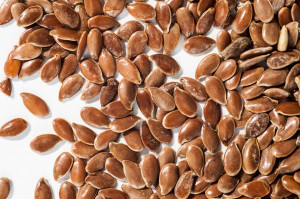It is a food and fiber crop that is grown in cooler regions of the world.
Contents
Uses
- Used for constipation
- Used for controlling levels of cholesterol and blood sugar in the body
- Flaxseed is also used for acne
- Attention deficit-hyperactivity disorder
- Kidney problems
- Symptoms of menopause
- Breast pain
- It is also used for diabetes, obesity and weight loss, HIV/AIDS, depression, bladder infections, malaria, and rheumatoid arthritis.
- Other uses include treatment of sore throat, upper respiratory tract infections and cough.
- Some people use flaxseed to lower their risk of getting weak bones (osteoporosis) and to protect against breast cancer, lung cancer, colon cancer, and prostate cancer.
- Flaxseed is sometimes applied to the skin for acne, burns, boils, eczema, psoriasis, and to soothe inflammation.
Benefits
- Lower blood cholesterol and blood sugar levels. The soluble fiber in flaxseed has been shown to lower cholesterol, helping to prevent the buildup of plaque, which can clog arteries and lead to high blood pressure, stroke, or heart attack. Fiber is also believed to lower blood sugar levels, which is important for people who have type 2 diabetes.
- Reduce bone loss. A study of diabetic rats showed a delay in bone loss after they were fed flaxseed, thanks to its concentration of fatty acids.
- Help with weight management. Flax expands when ingested, making you feel fuller. You might want to take flax 30 minutes before meals to control your appetite.
- Improve digestive health. The fiber in flaxseed can help relieve constipation and make you more regular.
- Increase immunity. ALA has been shown to decrease inflammation, which allows your immune system to function better. Preliminary research suggests that flaxseed can help relieve autoimmune and inflammatory disorders such as rheumatoid arthritis, psoriasis, and lupus.
- Fight cancer. Studies show that flaxseed may have a role in fighting cancer, particularly colon and breast cancer. The benefit is based on its high concentration of lignans, which are believed to inhibit tumor growth.
Cautions
- Pregnancy and breast-feeding: Taking flaxseed by mouth during pregnancy is POSSIBLY UNSAFE. Flaxseed can act like the hormone estrogen. Some healthcare providers worry that this might harm the pregnancy, although to date there is no reliable clinical evidence about the effects of flaxseed on pregnancy outcomes.
- Bleeding disorders: Flaxseed might slow clotting. Don’t use it, if you have a bleeding disorder.
- Diabetes: There is some evidence that flaxseed can lower blood sugar levels and might increase the blood sugar-lowering effects of some medicines used for diabetes. There is a concern that blood sugar could drop too low. If you have diabetes and use flaxseed, monitor your blood sugar levels closely.
- Gastrointestinal (GI) obstruction: The high fiber content of flaxseed might make the bowel obstruction worse.
- Hormone-sensitive cancers or conditions: Because flaxseed might act somewhat like the hormone estrogen, there is some concern that flaxseed might make hormone-sensitive conditions worse. Some of these conditions include breast, uterine, and ovarian cancer; endometriosis; and uterine fibroids.
Interactions
- Medications for diabetes (Antidiabetes drugs) interacts with FLAXSEED
Flaxseed can decrease blood sugar levels. Diabetes medications are also used to lower blood sugar. Taking flaxseed along with diabetes medications might cause your blood sugar to be too low. Monitor your blood sugar closely. The dose of your diabetes medication might need to be changed.Some medications used for diabetes include glimepiride (Amaryl), glyburide (DiaBeta, Glynase PresTab, Micronase), insulin, pioglitazone (Actos), rosiglitazone (Avandia), chlorpropamide (Diabinese), glipizide (Glucotrol), tolbutamide (Orinase), and others. - Medications that slow blood clotting (Anticoagulant / Antiplatelet drugs) interacts with FLAXSEED
Flaxseed might slow blood clotting. Taking flaxseed along with medications that also slow clotting might increase the chances of bruising and bleeding.Some medications that slow blood clotting include aspirin, clopidogrel (Plavix), diclofenac (Voltaren, Cataflam, others), ibuprofen (Advil, Motrin, others), naproxen (Anaprox, Naprosyn, others), dalteparin (Fragmin), enoxaparin (Lovenox), heparin, warfarin (Coumadin), and others.
Other Names
Alasi, Aliviraaii, Brown Flaxseed, Brown-Seeded Flax, Common Flax, Echter Lein, Flachs, Flachssamen, Flax, Flax Hull, Flax Lignans, Flax Meal, Flax Seed, Gemeiner Flachs, Golden Flax, Graine de Lin, Kattan, Keten, Leinsamen, Lignanes de Lin, Lignans, Lin, Lin Commun, Lin Oléagineux, Lin Textile, Linaza, Lini Semen, Linho, Lino, Lino Comune, Lino Mazzese, Lino Usuale, Linseed, Linseed Flax, Lint Bells, Linum, Linum crepitans, Linum humile, Linum usitatissimum, Malsag, Phytoestrogen, Phyto-œstrogène, Saatlein, Ta Ma, Tisii, Winterlien
References
Source:Wikipedia, https://en.wikipedia.org/wiki/Flax
Everyday Health, http://www.everydayhealth.com/diet-nutrition/tiny-flaxseed-has-big-benefits.aspx


Soothes irritated skin such as Eczema, Psoriasis, Burns, Dry-Cracked Skin, Bug Bites, Sunburns, etc.The combination of natural and organic ingredients have beneficial properties for skin.
Helps to reduce the look of fine lines and wrinkles. Makes your skin feel softer and smoother. Hypo allergenic and safe. Doesn’t contain harmful chemicals. Good for all skin types, especially sensitive skin. Visit the website at http://deluviausa.com/product-category/deluvia-skin-care/
Click to View what Alicia W., Co-Founder of Delúvia Inc. has to say about how the company started and how its products could help others.
https://www.youtube.com/watch?v=ePrifdk1Wus